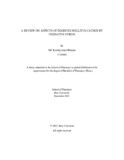A review on aspects of diabetes mellitus caused by oxidative stress

View/Open
Date
2022-12Publisher
Brac UniversityAuthor
Bhuiyan, Md. Rasshiq AminMetadata
Show full item recordAbstract
As a result of constant exposure to various stimuli, the human body produces reactive species
known as free radicals (ROS/RNS), which oxidize cellular components through the transfer of
their free unpaired electrons. The body possesses endogenous antioxidant systems, or it acquires
exogenous antioxidants from the diet to combat the harmful effects of such species. These
antioxidants neutralize the harmful species and maintain the body's homeostasis. Any imbalance
between RS and antioxidants causes oxidative stress, which in turn causes the emergence of
pathological conditions, one of which is diabetes. The majority of research suggest that oxidative
stress plays a role in the pathogenesis of diabetes through changes in enzymatic systems, lipid
peroxidation, poor glutathione metabolism, and decreased levels of vitamin C. Different
biomarkers of oxidative stress in diabetes mellitus include lipids, proteins, DNA damage,
glutathione, catalase, and superoxide dismutase. Diabetes complications brought on by oxidative
stress can include stroke, neuropathy, retinopathy, and nephropathy. This review's main goal was
to briefly summarize the fundamentals of oxidative stress in diabetes mellitus and propose some
natural remedies.
